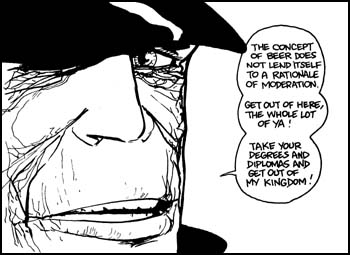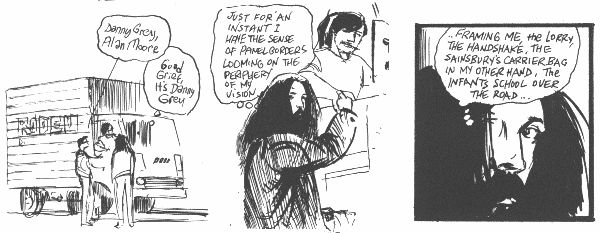Most of you will know Eddie Campbell, if you know him at all, from his work with Alan Moore on From Hell, Moore’s magnus opus on Jack the Ripper and the birth of the 20th century, amongst other things. What you may not be awareof is that Campbell has had a much longer career than that and is not just an artist, but a talented writer in his own right.

His best know solo work is probably Bacchus, a long running series starring the Greek god of alcohol and his adventures in the twentieth century. The centuries have not been kind to Bacchus and he’s now little more than a wino, though a wino who looks uncannily like Corto Maltese. The drawing is semi-realistic, more in the style of Milton Caniff or Hugo Pratt, though with periods of Kirbyesque excess. The stories are somewhat meandering, with interchanging episodes of high voltage action and more quiet, slice of life drama. Various other surviving Greek gods show up from time to time as well. The early stories are somewhat on the rough side still, but get much better over time. The best Bacchus book you can get is probably King Bacchus, with Bacchus is king of the Castle and Frog pub, which has seceded from the United Kingdom and declared its independence. The followup volumes are also quite good. But really, no Bacchus book is a bad buy, even the early, rougher volumes are worth getting.

Next to Bacchus, there’s Alec, which is basically a slightly fictionalised autobiography. Campbell has been doing these stories for years and unlike many cartoonists he’s actually had an interesting life. Born in Scotland, quite bright, worked for years in various blue collar jobs, started cartooning, lots of drunk adventures (notice a theme), got married, moved to Australia, got kids, settled down. Alec is the longest running series Campbell has been doing, having done Alec stories since he started drawing comics. What’s impressive about them is that, again unlike other cartoonists, he knows when to move the focus from his own life to that of the people around him, without coming across as a voyeur. Much of it feels like the sort of stories you’d tell your mates in the pub, only much better.
Campbell’s artwork is excellent, at its best in black and white I find. As said he is very much in the style of Hugo Pratt or Milton Caniff, though immediately recognisable as his own. He has an eye for small details and knows when to put in details and when to leave them out. The small samples here really do not do his work justice; the best way to sample his work is to get one of his books and
just start reading. Any good comic book store or library should have at least some.
Now to do a Mike Sterling and do a half post of linky goodness:
- Catalog of Campbell titles available via Top Shelf
- An interview, in comics form, at Powells
- The inevitable Wikipedia entry
- Checklist of Campbell’s work
- A review of Campbell’s latest work, The Fate of the Artist by Marc “not the Beastmaster” Singer
- Another interview, by Tom Spurgeon
- Lambiek’s entry on Eddie Campbell (Lambiek is officially the best comic store in the world, according to The Comics Journal.)